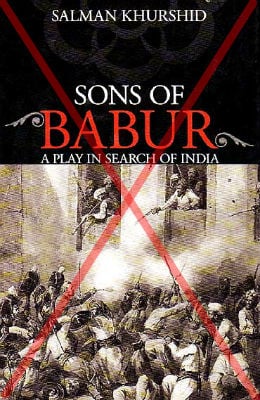By Anand Mathur

Salman Khurshid’s play – “Sons of Babur – A play in search of India” – is amateurish. A poseur, the play is patronizing, proselytizing and a lopsided genealogical assessment of history.
Deeply biased, it delves into the identity of an “Indian” in modern India through imagery and anecdotal inspiration from lives of Mughal Emperors.
Vague attempts to create harmony between Hindu and Islamic cultures fail. The author loses track, becoming an apologist for Mughals even as history forces him to acknowledge a bigoted Islam’s role. This is coupled with anti-Hindu rhetoric. Thus, while Chittor’s defeat was certain, Akbar “rues” that Rajputanis committed Jauhar. It is well known that conquered cities saw Golgotha’s, rapes and enslavement.
Attempts to understand Babur and Humayun are biased. In truth they were enterprising migrants using Islam to inspire soldiers, raising the banner of dar-ul-Islam to commit Hindu genocide for personal safety. Guru Nanak’s scathing assessment of Babur’s atrocities is known.
Akbar’s military compulsions called upon consolidating shaky gains politically. He found a willing ally in opportunist Man Singh; the latter tempted by loots from conquests and Mughal weaponry.
Akbar’s expansionism did not stop in lieu of his new found tolerance or as “Khurshid’s Akbar” claims that hunting was, “tugging at our conscience”. Akbar was no Emperor Ashoka.
The author errs in denying Maharana Pratap’s battle against Akbar was not religious. Mughal atrocities, cloaked as Jihad, were known to the defiant Maharana. In fact he was encouraged by Prithviraj Rathod from within Akbar’s court! The Maharana also approached Saint Tulsidas to prevail upon Man Singh from harassing a fellow Hindu.
The author proudly admits Mughal bias against Muslim Princess’ marrying Hindus. However, he makes no attempt to analyze the trauma ordinary citizens experienced due to Mughal policies. He generalizes the sporadic joint revolts against Mughals as examples of Hindu-Muslim camaraderie forgetting the horrible atrocities and conversion of Hindus!
He centers simplistic arguments on the emergence of a modern Indian identity when Zafar was proclaimed India’s Emperor in the Revolt of 1857; eulogizing Zafar when masses’ suffering reached its nadir! The debauchery of the elite is well captured by Munshi Premchand in his story “Shatranj ke Khiladi”. The author questions why no Maratha or Sikh filled in. He forgets that these warriors had brief years and meager resources with which they had chipped away at the terrible dynasty.
He forgets that “Indianness”, exists as “Bharat” from Emperor Bharat’s times and his descendants like Rama, whose rule inspired the household term “Ramrajya”, references to which are found in South Asia; or during Chandragupta Maurya’s Dynasty that successfully repelled the Greeks.
Unlike the superficial understanding of Monotheism by European/Middle Eastern masses, India absorbed its essence culturally, giving it resilience to absorb diversity and a unique political identity. India is well integrated post – independence, contrary to similarities cited with Europe.
Despite the power vacuum during times when Utopian Idealism reached its pinnacle under Buddhism’s influence, a definite politico-cultural identity prevailed within India before Islam’s advent. These values were revived through Saint Shankara in 8th Century and Bhakti movements that galvanized the entire nation wherefore indigenous leaders emerged.
It is this Indian identity that Indian Muslims have repeatedly denied.
The author’s dilemma is two pronged. On one hand is a resurgent Hindu majority, while on the other a Muslim community that resists Renaissance and acceptance of pre-Mughal influences.
The former is easy to resolve since Hindus increasingly show preference for secularism and good governance, rejecting religious dogmatism. Distrust of polity continues over the latter’s opportunism in using Muslims as vote banks, Partition’s trauma, infiltration, etc.
The play handles challenges facing the Muslim community vaguely even as the same resists attacks from imported Salafism, while desperately needing to look within and deal with its Indian heritage. He concedes that Muslims need to accept that modern laws have outpaced manmade Sharia and that Muslims are yet to come to terms with the fact that their rule over Hindus is over.
Khurshid repeatedly invokes Sufism to legitimize Islam’s mystical aspect but forgets that the hordes that invaded India did not come here as philosophers, rather with swords to run their writ. They were bigoted medieval barbarians, attempting to assimilate a people far beyond their sensibilities. Moreover, all Indian Muslims are not Sufi.
Immigrant Americans apologize to Native Americans; Germans for the wars; Modern India denounces casteism, yet we do not see any such bold introspection in this play.
The protagonist’s defense of democracy is a moral sham; the play being dedicated to the political toy, Sonia Gandhi!
Source : Dharma Next




